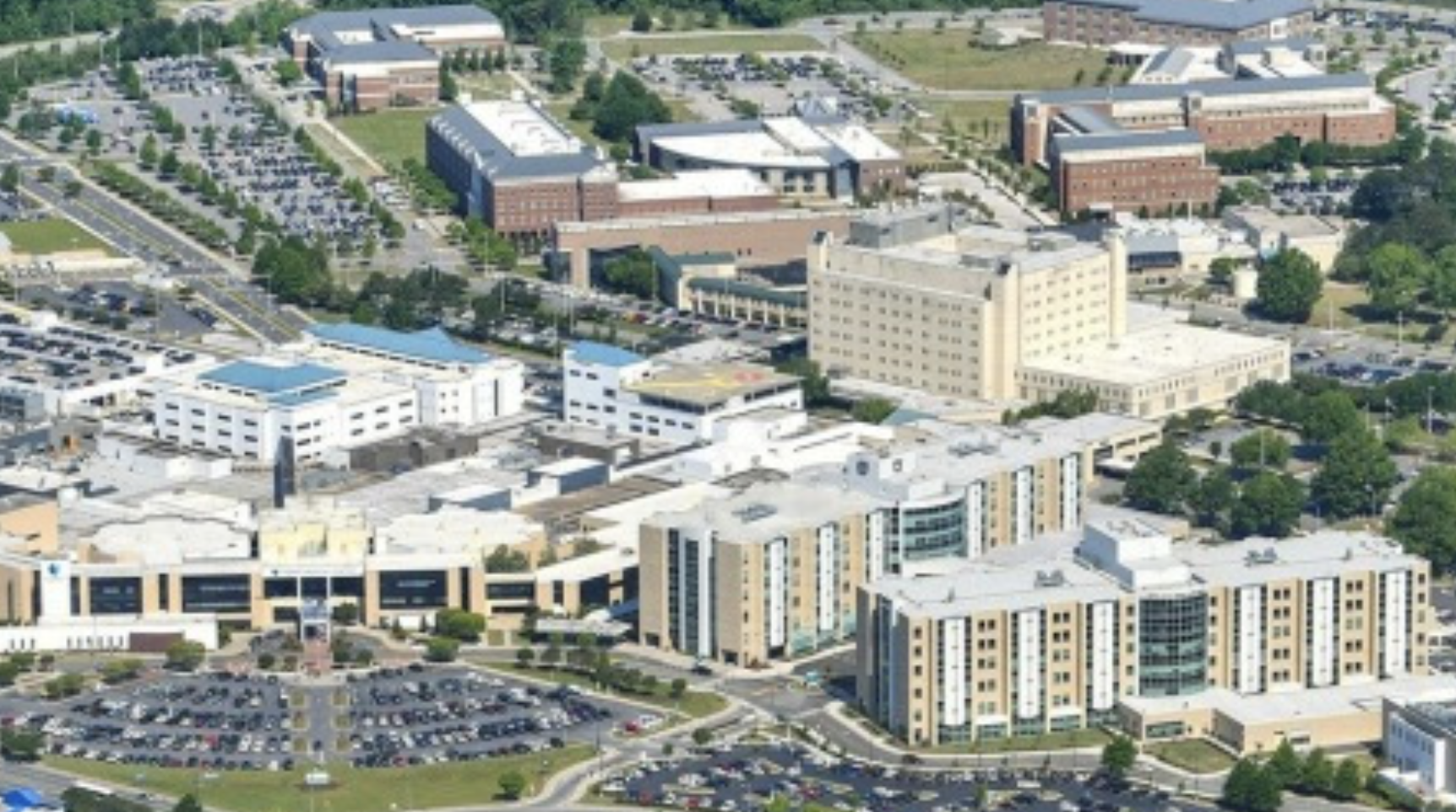< Back to May Cutting Edge
Fellowship Program at the Brody School of Medicine at East Carolina University
HISTORY
When I was recruited by Dr. Michael Rotondo to the Brody School of Medicine at East Carolina University in 2000, creating a surgical critical care (SCC) fellowship was part of our shared vision. We had each been immersed in excellent fellowship programs and aspired to replicate a similar experience of clinical, academic, and leadership excellence at ECU.
ECU was accredited by the ACGME as an SCC fellowship in 2004. As the concept of the acute care surgery (ACS) fellowship evolved within the AAST, we were eager to participate, and accordingly, in 2010, became the ninth AAST accredited fellowship. Since accreditation, we have added a second SCC and ACS position and now train four fellows. We have a very strong commitment to the philosophy and benefit of the full, two-year AAST experience and only interview candidates interested in the full ACS experience. I believe the program has evolved significantly and positively over the years, with much refinement thanks to fellow and graduate input. The program represents a fellowship that has been truly constructed by fellows.
FACILITIES
The vast majority of the training occurs at Vidant Medical Center (VMC), the 1,000-bed, a tertiary academic teaching affiliate of ECU. VMC is the sole tertiary care facility in all of Eastern North Carolina and the Outer Banks; it serves a twenty-nine-county region that sits on a 1 million square mile landmass. The trauma system is the largest in North Carolina, and it serves a very rural region (the majority of which is austere, to say the least) that includes the Outer Banks and some large regional military bases.
VMC is a long-standing ACS verified and North Carolina accredited, Level I trauma center, and it evaluates just under 4,000 trauma patients annually. A unique feature of VMC, which by demographic should be an exclusively blunt mechanism center, is the 15 percent rate of penetrating injury it treats. This affords fellows a wealth of experience in operative penetrating trauma. Blunt mechanisms are varied and challenging, and include high-speed, multisystem vehicular injury; hunting accidents; agricultural injury; marine injuries including shark attack; and various injuries incurred at the surrounding military bases. As the only tertiary hospital in a vast and underserved region, for staff, the emergency general surgery experience is one of high volume, complexity, and acuity.
CLINICAL TRAINING
Training for the entire SCC year takes place at VMC. Training is focused in the 24-bed trauma and surgical intensive care unit (TSICU), which includes critically ill trauma, emergency general surgery, and surgical subspecialty patients. Per ACGME rules, ten months of the year include surgical critical care, which itself includes rotations in the TSICU (six total months), and one month of rotations in critical care ultrasonography, as well as anesthesia, neurosurgical, and cardiothoracic critical care. The year also includes two elective months; we have rotations available in medical, burn (UNC), and cardiac critical care, as well as additional months in the TSICU. The SCC year is a robust and immersive year of learning. Upon completion of the year, we are confident that fellows are prepared for all clinical and leadership elements of surgical critical care, including ECMO, advanced ventilator and monitoring techniques, and ultrasonography.
Despite what we feel is an outstanding SCC experience, the strength of the fellowship at ECU is perhaps the ACS year. Following the directive of the AAST, the learning is experiential, so we no longer have mandatory rotations. The majority of the year is comprised of multiple, one-month rotations with trauma or emergency general surgery services, with the fellow serving in the role of junior faculty. A member of the teaching faculty is always assigned to the services for appropriate oversight and supervision.
Training in resuscitation and operative trauma is sound; the program offers ample experience with massive transfusion, whole blood resuscitation, REBOA, and thromboelastography. Although there are no mandatory rotations, we have retained formal elective rotations in orthopedics, neurosurgery, urology, vascular, and thoracic surgery, and because of the excellent learning and operative experience, fellows typically want and choose to complete all five electives. An international rotation in South Africa is available in the second year as well. In summary, although the foundation of the second year is always trauma and EGS, we truly cater the year to the needs of the individual fellow.
The call schedule is standardized and consistent. Fellows serve in the role of junior faculty while on call. They cover trauma and the TSICU during the first year, and trauma, TSICU, and EGS during the second year. The four fellows collaborate to make the call schedule. We take duty hours and supervision seriously, and accordingly, ensure faculty are in house for direct supervision throughout the SCC year. In addition, regardless of the year or rotation, fellows are always dismissed after morning report when post-call. Supervision during the second year is governed by a policy of graded autonomy, and fellows are typically afforded autonomous call after January. However, due to the clinical volume during night call, and a shared educational philosophy within the faculty that we should always be immediately available for teaching and support, faculty remain in house throughout the second year.
EDUCATIONAL RESOURCES AND SUPPORT
Both years are guided by a comprehensive curriculum, with clear goals and objectives for each rotation. The second-year curriculum is based primarily on the AAST online educational modules. The four fellows meet with the program director (PD), coordinator, and associate PD monthly for “fellow check-ins” with an agenda that includes a review of autonomy, supervision, duty hours, research productivity, curriculum progress, procedure logs, and wellness. Goals and objectives for the subsequent rotation are reviewed. The program has multiple standardized conferences, including Thursday’s Fellow’s Seminar—an hour-long conference designed by past fellows. It features a rotating monthly agenda of journal club, a guest lecturer, point-counterpoint, and virtual lecture, frequently utilizing an AAST Meet the Masters or Grand Rounds lecture. Fellows are expected to teach ATLS and are encouraged to participate in and teach FCCS. ATOM and ASSET courses are also available and funded. Fellows are funded to attend annual meetings—SCCM in the first year and AAST in the second year. In addition to the elective rotation in South Africa, additional global opportunities are available. Second-year fellows have the opportunity to spend one week operating with teaching faculty in Honduras, as well as a week teaching FCCS with the PD in various locations—most recently, in Rwanda and Jerusalem.
PROGRAM STRENGTHS
The strengths of the ECU fellowship are multiple. I believe that perhaps the first question a candidate should consider when inquiring about training programs ought to relate to volume and acuity: a clear strength of a fellowship lies in the volume and complexity of the experience. But many ACS fellowships are similarly busy, so what distinguishing features make the ECU experience distinctive?
- Foremost, I feel that we have assembled one of the most competent and dedicated groups of surgical educators in the country. Our faculty hail from strong and diverse fellowships, and so bring a rich composite of teaching expertise and commitment to the program. The range in experience spans from one to twenty-one years, and the high faculty retention within the program speaks to the very unique friendship, respect, and collegiality that is present within the division.
- An additional strength relates to the quality of the two-year experience. There are many excellent ACS programs in the country, but many offer uniquely strong SCC or trauma/EGS years. It is rare to find a fellowship that is consistently strong in both years. Our SCC year prepares graduates for essentially any clinical or procedural need, particularly since our division began cannulating and managing our own patients on ECMO. The second year in our program, primarily a high-volume trauma/EGS year, also offers elective rotations such as neurosurgery, urology, and orthopedics which have no residents/fellows. This structure offers fellows unique, one-on-one operative mentorship experience with faculty.
- Both years offer multiple opportunities for leadership development in any pillar of acute care surgery. Individual fellows work with the program leadership to define leadership roles and experiences of interest, including leadership roles within trauma centers and systems, TSICU administration, educational program directorship, EGS, or performance improvement. Fellows are encouraged to attend state Committee on Trauma meetings with the PD, teach the Rural Trauma Team Development course, serve on state COT committees, and participate in regional education and outreach.
- Another clear strength of the fellowship relates to exposure to pediatric trauma. As an ACS Level II pediatric center, adult trauma surgeons are the first responders to pediatric activations. We have support from a superb division of pediatric surgery, but all acute resuscitations, and the initiation of operations, are done by the adult trauma surgery faculty. Because call responsibility for fellows in both the SCC and ACS years is in the role of junior faculty, fellows get a solid two-year experience resuscitating and operating on injured children.
- The two-year experience offers ample opportunities for research. The division has a hospital-funded research coordinator for IRB, and budget support and departmental-based statistical support are available. There is ample division-based intramural funding available for basic science (primarily large animals) and prospective clinical studies. In addition, fellows are funded to attend any meeting at which a podium presentation is being given.
- The operative experience within the SCC year is significant. We make a concerted effort, within ACGME guidelines, to get first-year fellows into the OR. Cases are obtained primarily through night call, but fellows are also permitted during TSICU months to return to the OR with damage-control patients or to perform bedside procedures in the TSICU, or assist faculty and second-year fellows with EGS overflow.
- The final strength of our program is more difficult to describe but is perhaps one of the most tangible benefits of the two-year experience: the esprit de corps within the program. We recruit fellows that embody the characteristics of the faculty: dedication to teaching and service, affability, professionalism, equipoise, and a love of life and vocation. In this environment, fellows grow as clinicians, as individuals, and as future partners and leaders. Fellows attend faculty meetings, receive leadership training, billing education, and are immersed in the PI program and other endeavors that truly prepare fellows for all elements of practice.
I believe the fellowship program at the Brody School of Medicine at ECU is much more than great training. I believe any graduate would attest that they not only received outstanding training, but that they also had a truly great experience that took place in an environment with great people who are dedicated to teaching, service, and mentorship.
“Katherine McBride, 2nd year fellow, teaching in Rwanda”
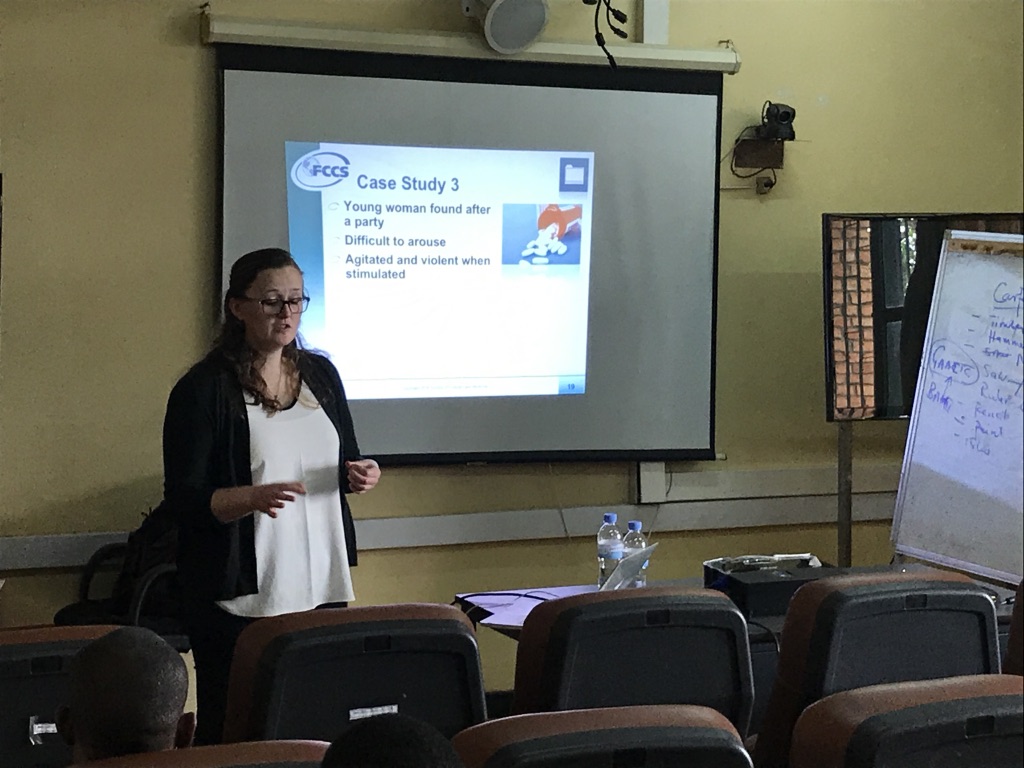
“Sunrise over the Outer Banks”

“Dr. Toschlog, PD and Joel Goodwin, past fellow”
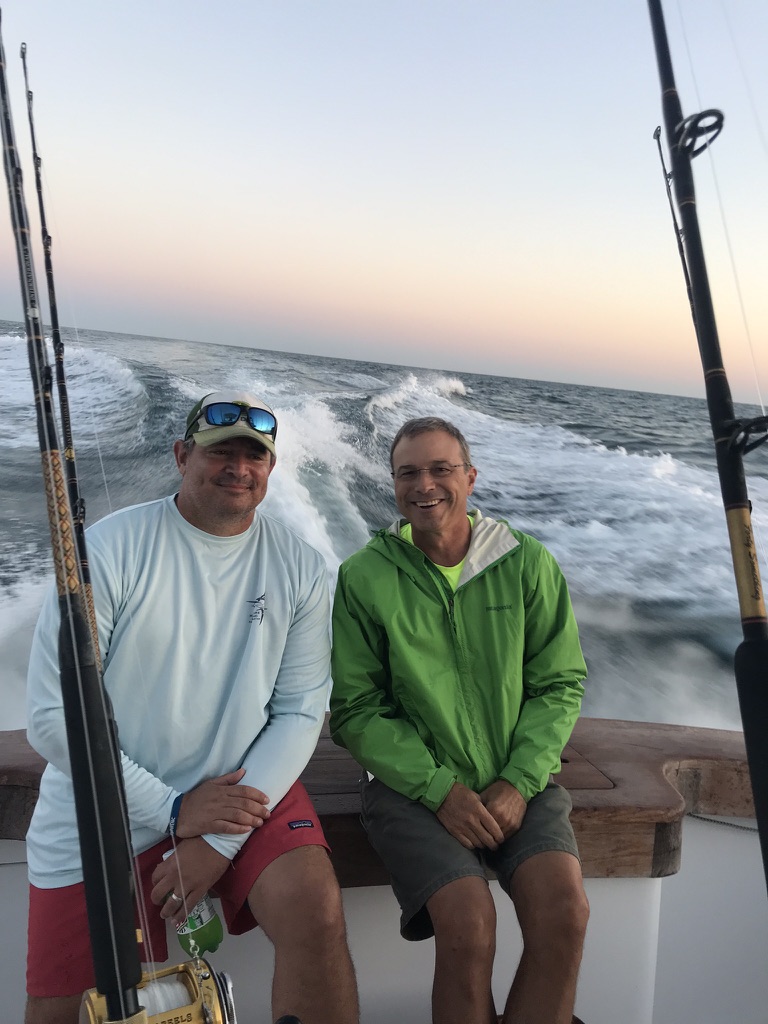
“Fellows with the past president Dr. Rotondo”
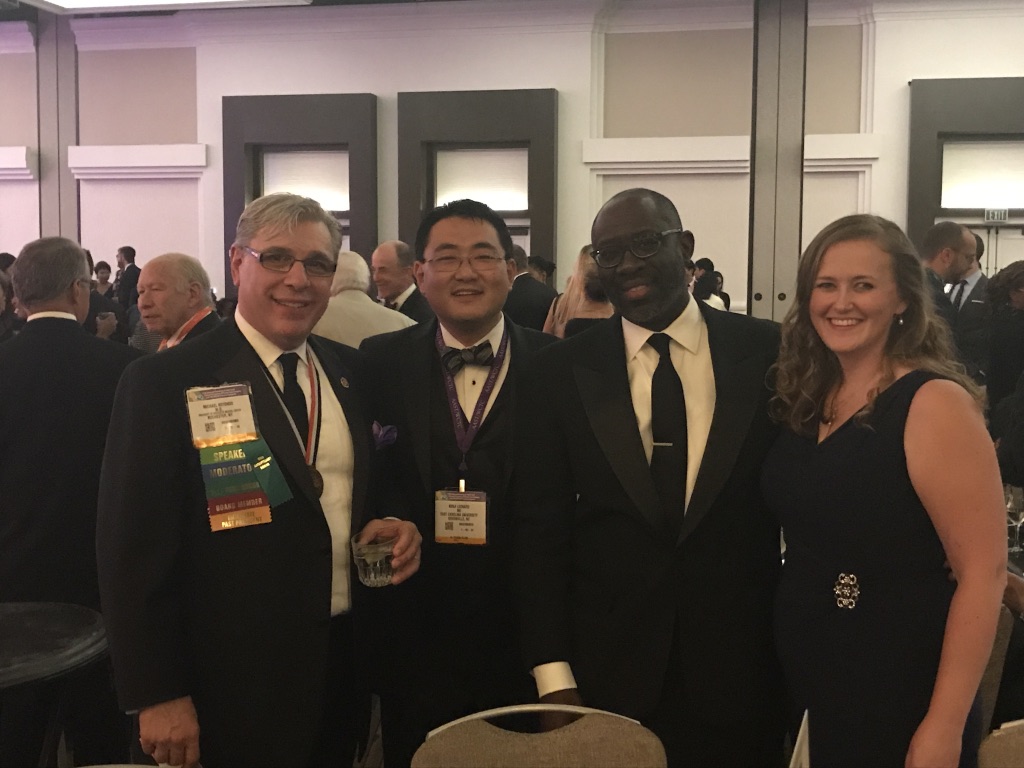
“Deep sea fishing with faculty and fellows”

“Morning Report”
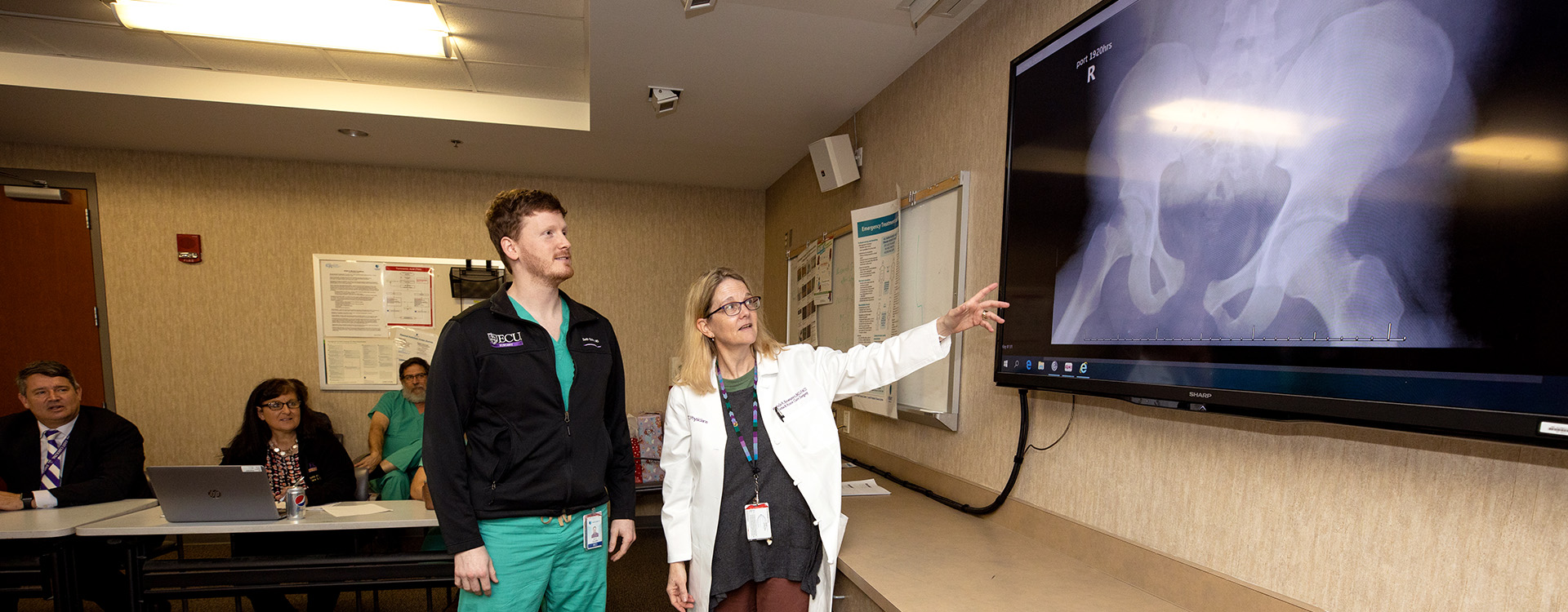
"Vidant Medical Center and the Brody School of Medicine”
